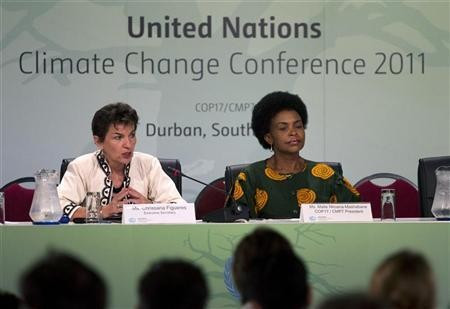Climate Change Summit: Roundup of Durban Climate Talks

As the U.N. climate change conference in Durban, South Africa drew to a close Friday, officials announced few positive results, as many environmentalists predicted. Is it too late?
While people waited for the final conclusions from official delegates and global leaders, the key points raised in discussions could shape a promising move forward for future agreements on tackling climate change.
EU Roadmap
Officials outlined a new legal framework for a global climate change beyond 2020 in a proposed deal that participating governments were asked to sign Friday night.
The EU roadmap sets targets and timelines for a legally-binding agreement that is to be signed by 2015, which will require both developed and developing countries to commit to carbon emission reductions after 2020.
Gaining support for the roadmap will be a prerequisite for employing a second commitment phase of the Kyoto Protocol.
The protocol, meant as a guideline to reduce greenhouse gases globally, is due to expire in 2012 and has been the subject of anxious negotiations in the final moments of the two-week conference.
Some countries, including China and India, find it difficult to sign on as the text now stands.
Accepting the second iteration of the protocol would require negotiators to launch a process in order to draw up a legal framework applicable to all - both developed and developing countries.
This means a structured agreement where countries would commit to new targets to reduce carbon emissions after 2020 when current, though not binding, targets expire.
While the phrase "legal framework" is not a "legally-binding treaty", as the EU wants, it may be enough to convince the U.S. to agree to a new treaty.
The negotiating process for this should begin immediately and finish as soon as possible, but no later than 2015. This may prove challenging, however, as the U.S. has yet to show signs of committing to any agreements or dates.
In return for supporting this roadmap, the EU has agreed to maintain the Kyoto Protocol after the first commitment period expires in 2012.
Second Commitment Phase of the Kyoto Protocol
EU Climate Commissioner Connie Hedegaard stepped up warnings at the summit, saying that if major economies do not compromise, a Durban deal may be out of reach.
While developing countries are keen for a second period of the Kyoto Protocol, any future agreement will have to include both developed and developing countries and require them to make sacrifices.
Earlier, Ms Hedegaard said both Brazil and South Africa had indicated that they would be willing to accept a legally-binding agreement in which they would be obligated to slash emissions.
"India has a tough stance here and that's why I note, with great satisfaction, that South Africa and Brazil are moving their positions," she said.
According to British media reports, South Africa's chief climate change negotiator, Alf Wills, clarified the host country's position, saying that while the country was willing to join a legally binding-agreement after 2020. The agreement would be on the understanding that there is a distinction between what is required of developed and developing countries.
"The future needs to be built on the principle of common but differentiated responsibilities," he said.
This principle has persisted and featured as one of the main points of discussion in negotiations over the past few years.
It acknowledges that while all countries need to take action to reduce carbon emissions, developing countries should adhere to different targets. These targets should depend on their ability to cut emissions, based on their financial and technological ability to do so.
Green Climate Fund
While any confirmed agreements have yet to come out of the talks in Durban, many are hopeful for a deal on the Green Climate Fund.
It could be the only plan negotiators might agree on, with hopes that a commitment to launch the fund will be confirmed at the close of the summit.
UN Secretary-General Ban Ki-moon called for action for the fund at talks on Wednesday and urged global leaders to resolve any differences they may have to ensure the fund could be launched.
The Green Climate Fund, which was agreed on at the U.N. climate talks in Cancun in 2010, aims to raise and distribute $100 billion per year by 2020 to assist developing and vulnerable nations tackle climate change.
Mr Ban said the U.N. was "deeply committed" to the scheme to ensure developing countries can access and use the funds.
In a media conference in Durban on Friday, conference president Maite Nkoana-Mashabane said delegates were still trying to make a breakthrough on a second commitment period for the Kyoto Protocol and activation of the Green Climate Fund.
"At the moment there are various options that the parties are considering in relation to the issue of the second commitment period of the Kyoto Protocol and the future process as well, as long-term finance with specific reference to the operationalisation of the Green Climate Fund. Parties are expressing the hope that the Green Climate Fund can be launched here in Durban," she said.
Ms Nkoana-Mashabane said there was limited time left to conclude the negotiations. "We remain hopeful that we can make further progress within this limited period," she added.
© Copyright IBTimes 2025. All rights reserved.





















